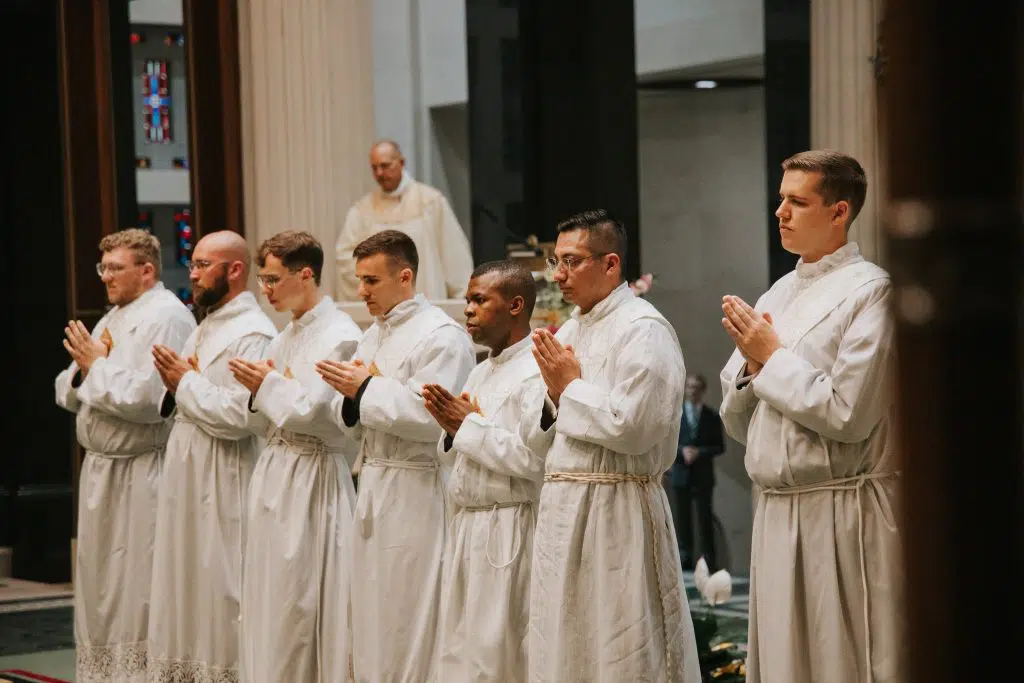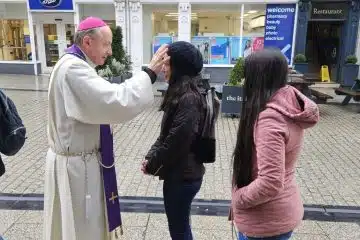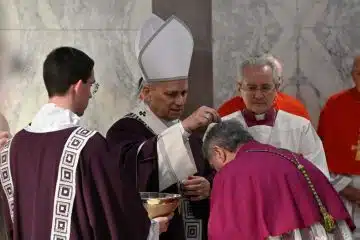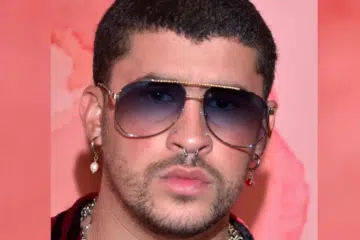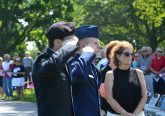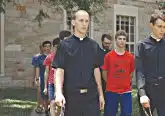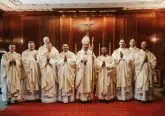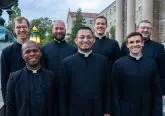Ordination 2022: Meet Ethan Hoying
I am 27 years old. Typical Catholic family – my parents will celebrate their 30th wedding anniversary the day after my First Mass (two days after my priestly ordination). My dad is an engineer. My mom works part-time at the parish office, babysits for my nieces and nephew. Growing up she was a stay-at-home mom. I have 2 brothers and 1 sister. My older brother is 2 years older than me – he is a physical therapist, married with 2 girls and a boy. My younger brother is 2 years younger than me – he was in seminary for one year with me before leaving to become an engineer and is married. My parents and both of my brothers and their families all still live in Russia. My sister is 9 years younger than me and will graduate high school this year. I am close to all of my siblings and much inspiration in my life comes from them. My extended family is quite large on my mother’s side. My mother is the nineteenth of 20 children, each of whom married with kids.
I was raised on a family farm just outside the small town of Russia (Roo-she), OH. Russia is a very special place. The heart of the community, both geographically and in many residents’ lives, is the parish church, St. Remy’s. It is a generational town – meaning that my grandparents, great-grandparents, great-great-grandparents, etc. grew up and lived in Russia. The cultural life of the community is St. Remy’s; it is the town’s identity. There are not many places anymore where one can attend the Holy Mass and sit, kneel, and stand in a pew where the whole family and Grandma and Grandpa are sitting at the end of the pew. Not to mention aunts and uncles, neighbors, and friends in the pews in front of and back of yours. There is not a stranger in the community mostly because everyone is related somehow. My siblings, parents, grandparents – all were married at St. Remy’s.
Growing up on a farm is one of the most appreciated aspects of my life. And I still enjoy slipping home when I can just to feel the dirt in my hands and find something to keep me busy. I particularly enjoy when there is work which involves working with Dad or one of my brothers or cousins.
I attended college seminary at the Pontifical College Josephinum and upon graduation I moved on to Mt. St. Mary’s, where I find myself today.
Growing up, my family and home life fostered, what I would call a ‘natural’ vocation in me. We were/are ardent members of St. Remy Church, and my high school was predominately catholic. In the 7th grade, I started serving the Holy Mass (quite frequently) and served Benediction of the Most Blessed Sacrament almost every week on Thursday evenings from the time I started in the 7th grade until I graduated and left for college seminary. I love(d) serving the Holy Mass. I also was a part of the youth group. Serving Holy Mass was a big part of my discernment.
Another big part of my discernment, and not disconnected from the above point about serving, was my childhood pastor (explained more below). He planted the seeds of my discernment and in a way which fitted me perfectly. It wasn’t so much that he talked about discernment or vocations (although I know he did and have several memorable points on this from him), rather he presented discernment and priesthood by the way he lived his life. My simple interactions with him in the sacristy before and after weekly Benediction, seeing him offer the Holy Mass, etc. – all made huge impressions on me.
Looking back on my life, I can see where the hand of God molded my vocation from the very beginning. However, this is only because I have been in seminary for 9 years now. Growing up my discernment was a very different thing. I was a cradle Catholic and grew into the faith with the family. However, my discernment started with my pastor. Although I wouldn’t call it discernment. There was something very attractive about the way he lived his life and I was intrigued by it. Seeing him, the thought of being a priest had entered my mind on occasion – and I was open to entertaining the idea – but how could I? I had never received a call from God.
In my last couple years of high school those occasional thoughts did not disappear, and I wrestled with the idea of what to do after graduation. I knew that I had to make some sort of decision of what to do. I had visited a few college campuses, but to be honest, I was really only fooling myself. Eventually I had enough guts to admit to myself that my decision of what to do after graduation had to come down to this: I knew that I would never know for certain whether God was calling to be a priest if I did not go to seminary and at least try it out – and I did not want to be always looking back for the rest of my life wondering what might have been.
So I entered college seminary in the Fall of 2013, and I could not have been more thankful or happy. For in seminary for the first time I really began to feel the call of my vocation. Seminary was the place where my vocation became alive because finally there was a peace in the depths of my soul. My vocation did not involve any “love at first sight” or “firework” moments. There was no miraculous intervention where God opened the heavens and called down to me. In fact, there is not some definitive moment where I knew for certain of what God wanted me to do – never to look back. Instead my vocation was a gradual progression. As I grew, my vocation grew on me. That’s why I call it a natural vocation. And seminary gave me the tools to see this. It showed me how to open myself up to hearing the quiet whispers of the voice of God amidst the storms that had threatened the peace I desperately and unknowingly was searching for. So I really didn’t begin discerning my vocation until I went to seminary. I was open to a vocation and that is what was important in my life.
In many ways I often think that my vocation story is atypical. Certainly, talking with my brother seminarians and listening to the experience of their discernment and their vocations stories – I too often if not always find that their vocations contained a divine intervention when God corrected the path they were on and led them to Himself. Mine was not like that. It was simply a part of my everyday life. It was natural. This is part of the reason why I think we sometimes “miss” our vocation in life. Because we are not open to hearing it. Certainly God does call some in a miraculous way. But He also beckons in the depths of the heart, and it takes time and tools to realize what is happening. I found that time and those tools in college seminary.
Fr. Frank Amberger, my pastor for “my impressionable and informative years.” He was assigned to my home parish, St. Remy’s, the summer after I made my First Holy Communion and was going to enter the 3rd grade that Fall. He was pastor there until the summer after I had completed my first year in college seminary. The way in which he lived (lives) his life was something which was very attractive. And it very much intrigued me – although it was hard to explain why.
Another mentor of mine is St. Pius X, who was pope during the beginning of the twentieth century. He has been my best friend (and confirmation patron) for many years of my life now. And this highlights that we just don’t have to be friends with those on Earth! What first attracted me to him was his ardent love for the Most Blessed Sacrament, his devotion to our Blessed Mother, and his profound humility.
Lastly, my grandparents, each in their own way, have been huge mentors to me. I would not be who I am today if it wasn’t for each of them. (I can say more about this if you want me to; just let me know.)
I am most looking forward to offering the Holy Sacrifice of the Mass. A close second is listening to confessions. And praying for the flock entrusted to my care. The Most Blessed Sacrament and the Sacrament of Confession are the two things which have been my biggest help, my greatest peace, and my most ardent loves. They have been such a huge and integral part of my life (and still are) that I want to first and foremost share the divine power in the sacraments with others. I want to help others discover the hidden treasures, the great mysteries, that are these two sacraments.
It is my hope and prayer that as a priest I will be able to intercede for the salvation of souls. Like the vocations of many adult men, the priest too has a vocation to fatherhood. If the parish is a family, the priest is the father of this family. He is someone who instructs the faithful both by his words and his example. He is called to admonish and to praise. He is called to strengthen those whose faith is weak and to enliven those who are believers in name only, who can easily say, “Lord, I believe; help my unbelief.”
The priest must be both priest and victim, someone who stands before God willing to suffer for the sake of the world.
The key word for the priest today is witness. It is not so much a matter of preaching God and good morals to the men and women around oneself as it is a matter of living the out faith that the priest himself has professed. Thus, my vocation is not simply putting to use the skills and training which I have received in seminary but a giving of my whole self.
It is my hope that Christ is able through me to offer a glimmer of hope to the people of faith and the people of the world. In some way, I hope to educate and lead the young as I hope to pray at the bedside of the dying. I aspire to unite and sanctify families by making the universal call to holiness seem applicable, desirable, and achievable. Of course, knowing all along that it is only Christ Who can satisfy the deepest longings which reside in every human heart.
My favorite prayer is the Holy Sacrifice of the Mass. I also enjoy saying the psalms in the Divine Office (the Liturgy of the Hours). Many people think that the best kind of prayers are the ones in which you (the individual) or a priest or leader makes up the words as you pray – spontaneous so to speak. And while I think such prayers are powerful, I disagree. The most powerful prayers are the ones whose words are formed by God Himself. God has given us what to pray in the psalms through His servant King David. The psalms take on all the different aspects of our very human lives – joy, faith, hope, trial, tribulation, suffering, death, peace, love – and it puts them into words. The psalms take our human feelings, thoughts, inspirations, ambitions, longings and presents them before God our Father. They also give God’s response and understanding. In the psalms, the words of men and the words of God (or more appropriately, the Word of God) converge and become one.
I also enjoying praying the rosary, aka “the poor man’s psalter.”
Of course, I have a great devotion to many saints: Pius X, John Vianney, Josemaria Escriva, Therese, Isaac Jogues, Edmund Campion… I could easily keep going.
I like farming, hiking, doing anything out in the woods, working outdoors. I also like reading, watching movies, hanging out with friends and family, playing cards.
Pray for me! It has been said that a priest is only as good as much as people pray for him. So pray for me! I cannot ask you enough – indeed beg – for you to pray for me. I will never be able to repay those who pray for me, although our Heavenly Father can and surely will. Let us pray for each other!
